In search engine optimization, one of the main objectives is for a page to appear in the best possible position in the Google SERPs for a certain keyword.
Many times, and unconsciously, different URLs of the same web page try to position themselves for the same keyword, a situation that will end up penalizing the positioning of the site. This SEO cannibalization is a practice that should be avoided in most cases, being more interesting to try to position the URLs of a website by different keywords so that they can achieve better positions on the results page of Google.
Before going any further, you should know that there are SEO tools that take care of controlling the cannibalization of your projects. In this article we will also see how such a tool works.
What is SEO cannibalization?
SEO cannibalization arises when multiple pages within the same website compete for ranking on the same keyword. Unfortunately, this situation often leads to a suboptimal outcome since search engines like Google struggle to determine which page should take precedence. As a result, none of these URLs will perform at their best in search rankings. Let’s look at an example:
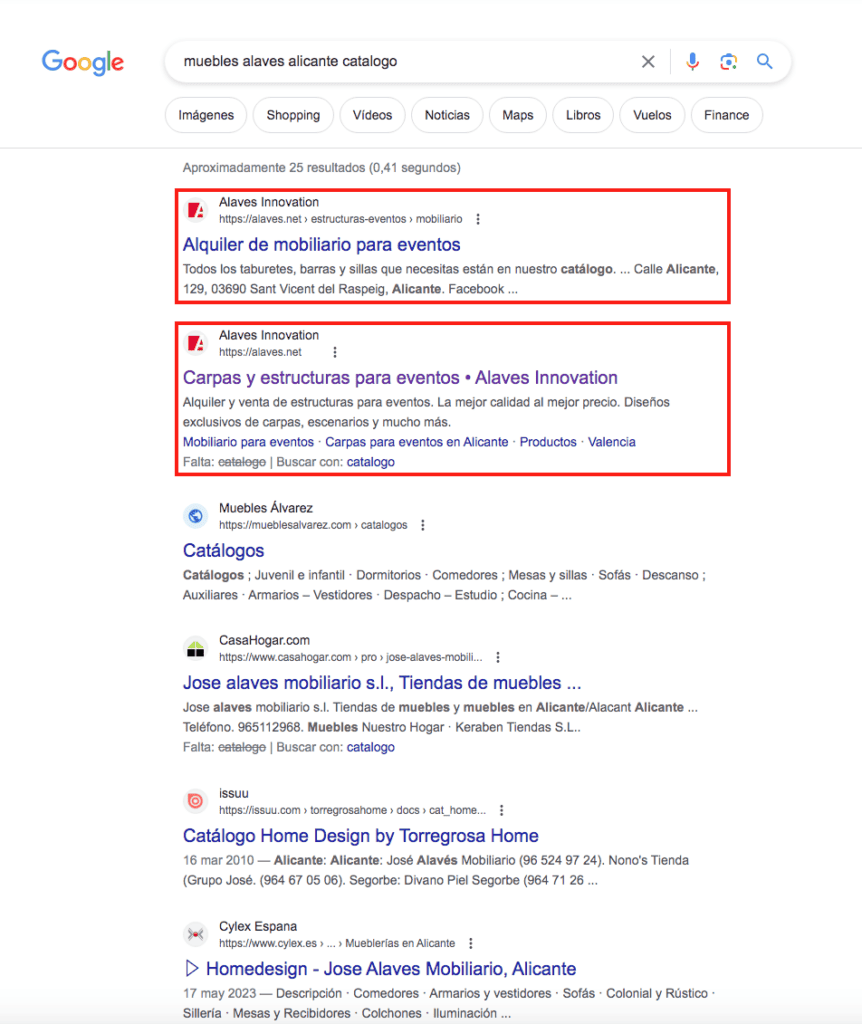
In the search “muebles alaves alicante catálogo” (in Spanish), we see that the company Alaves Innovation is ranking with two different URLs in the first two positions. This is a type of cannibalization that we should not worry about (it is ranking two transactional pages in positions 1 and 2). See below for other examples of cannibalization. This example is simply for you to understand the main concept of what is a “Possible cannibalization”.
The Purpose of Keyword Cannibalization
Keyword cannibalization is an attempt to secure multiple URLs on Google’s search results pages for the same keyword. While this may work for industry giants like Amazon and AliExpress, smaller websites should steer clear of this practice to avoid harming their rankings.
Why Avoiding Keyword Cannibalization is Vital for SEO
When Google’s bots crawl a website and find several URLs vying for the same keyword, they can’t discern which one is the most relevant. Consequently, none of these pages will receive prioritization. The end result is a collective drop in search rankings and a failure to secure prime positions on search pages.
However, if each URL targets a distinct keyword (even if related or derivative), Google will prioritize them individually over the rest. This grants them a better chance at reaching higher positions in the rankings.
When can SEO cannibalization occur?
Keyword cannibalization frequently occurs when website owners attempt to position numerous pages with the same keyword. For instance, a website focusing on employment counseling might try to optimize all its sections and articles for the keyword “employment counseling.” This confuses search engines, leading to poor rankings for all pages on the site.
Types of Cannibalization
There are two types of cannibalization:
1. Simultaneous SERP Presence
This occurs when multiple URLs from your site appear together in the search results. In such cases, you must decide which one is more advantageous. For example, if a blog URL ranks at position 3 and a service URL is at position 7, prioritize the service URL that can generate higher revenue. Take appropriate actions to manage this scenario.
2. Occasional URL change on a keyword and drop in ranking position
These are the most difficult cannibalizations to discover and they are also the most dangerous for your project.
Imagine that for a certain keyword, your URL1 is in ranking 3. From time to time (some days) you have drops in ranking and you go to position 40, but in that position 40 appears your URL2. Let’s see an example:
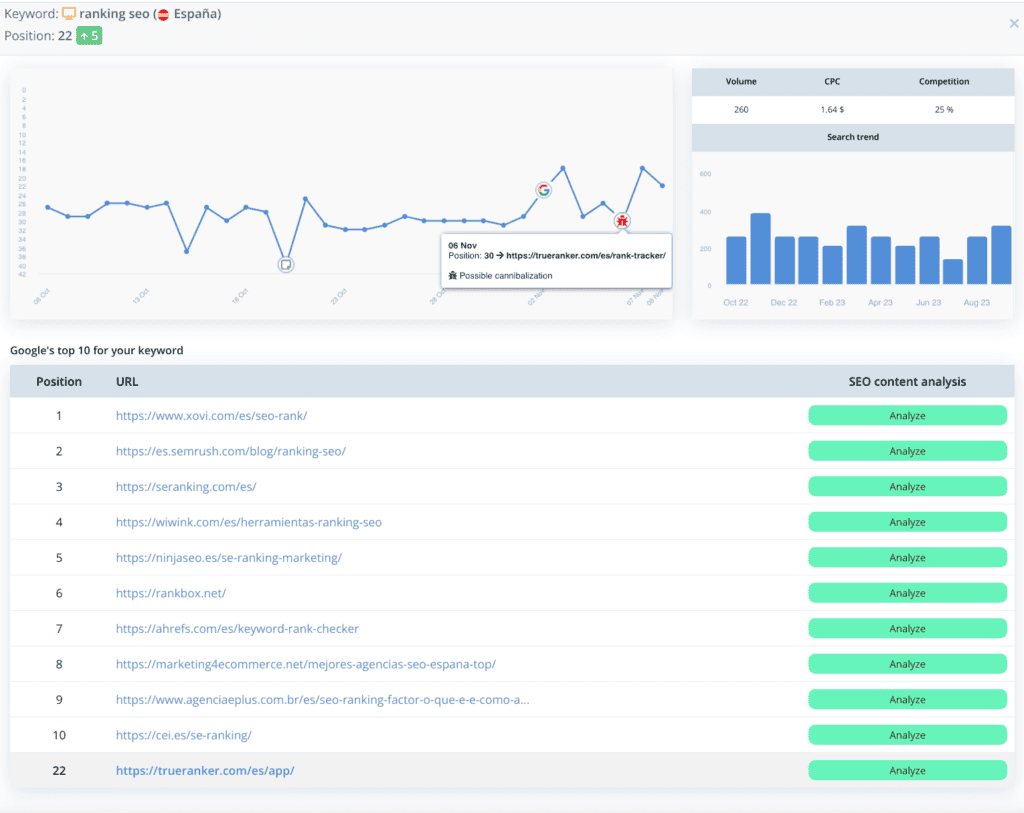
In this example we have the following data:
- Keyword: ranking seo
- Site on which the search was performed: Spain
- Device on which the search was performed: Desktop
- Current position: 22
- Domain: trueranker.com
- Ranked URL: https://trueranker.com/es/app/ (URL1)
In the graph we can see the evolution of the position for the keyword “ranking seo” for one month. We can see how the keyword has high peaks and low peaks, and in the graph we can see a red icon indicating the cannibalization.
Next to the icon we can see the URL that is cannibalizing:
https://trueranker.com/es/rank-tracker-alternative/ (URL2)
If we look at the graph by placing the mouse over the dots on each date, we will see that the lowest positions coincide with URL2 (the URL that is cannibalizing). In this case we will have to find the solution so that Google understands that the URL we are interested in is URL1 (internal links, external links, canonical URL, etc). To realize the cannibalization that happens on this keyword, we have used TrueRanker.
Monitor rankings and SEO cannibalizations of 100 keywords FREE for 14 days. We do not ask for credit card or payment method.
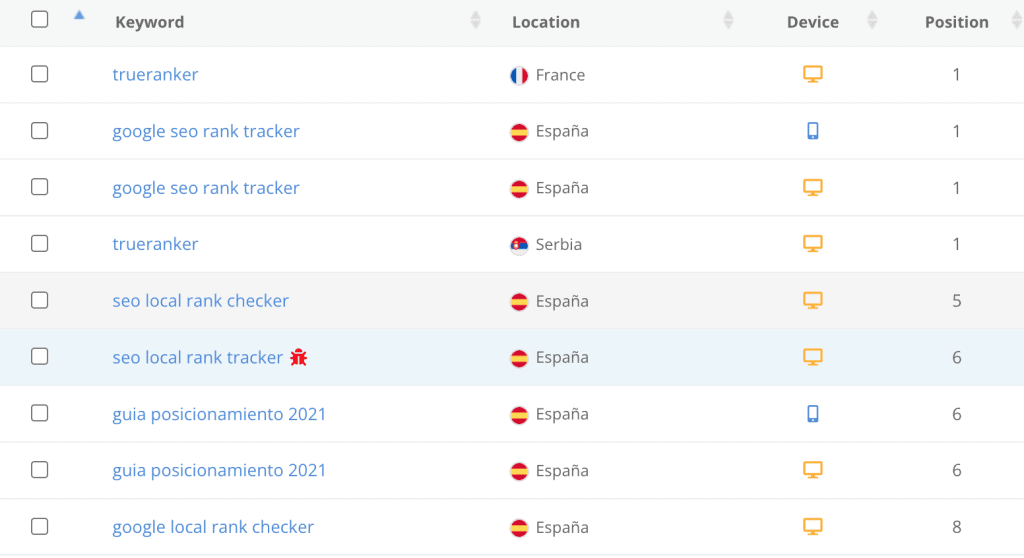
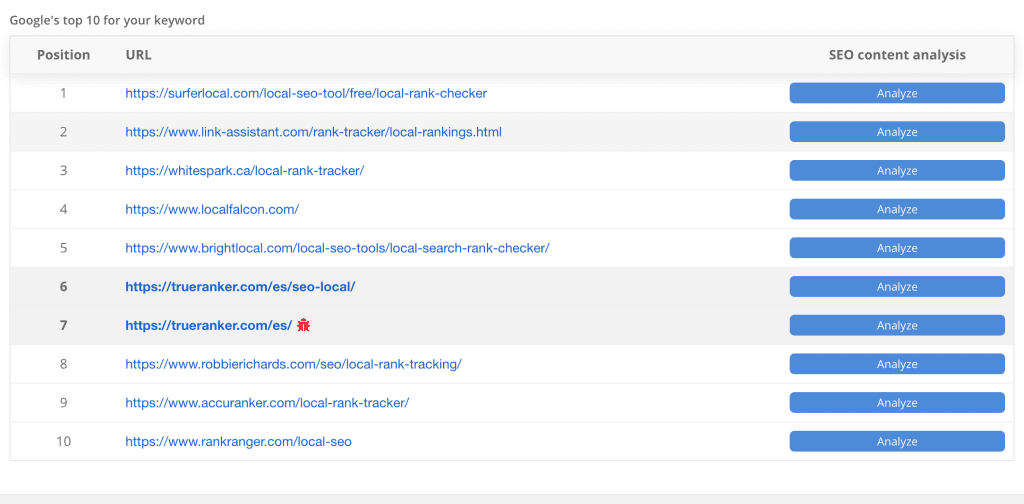
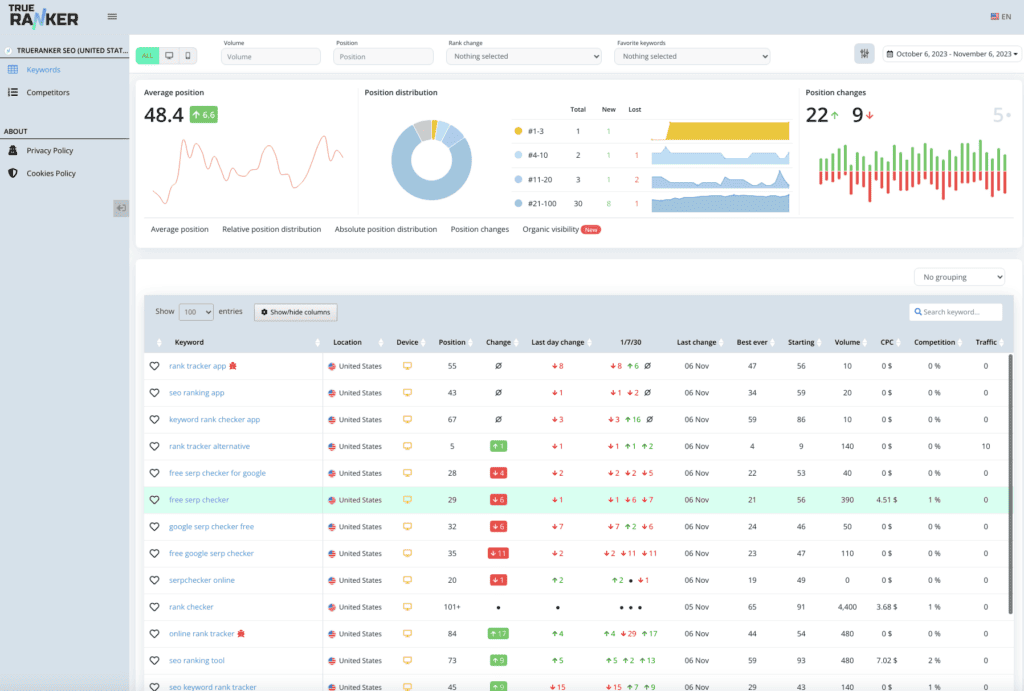
How to detect and fix cannibalizations
Detect keyword cannibalization from Google
To find out if keyword cannibalizations are taking place on a website, you can use Google’s own search engine together with the SITE: command, to perform a search only on the website for a keyword.
For example, entering in the Google search field: SITE: www.website.com + “keyword”, all the pages of the site positioned by that keyword will be obtained on the results page. By analyzing the results it is possible to identify if there are two or more pages of the site competing for the same keyword.
Detect keyword cannibalization from Google Search Console
Another interesting option to detect keyword cannibalization is to use the free Google Search Console tool. In the Search results menu, you can see the cannibalizations for a given keyword. Let’s see an example:
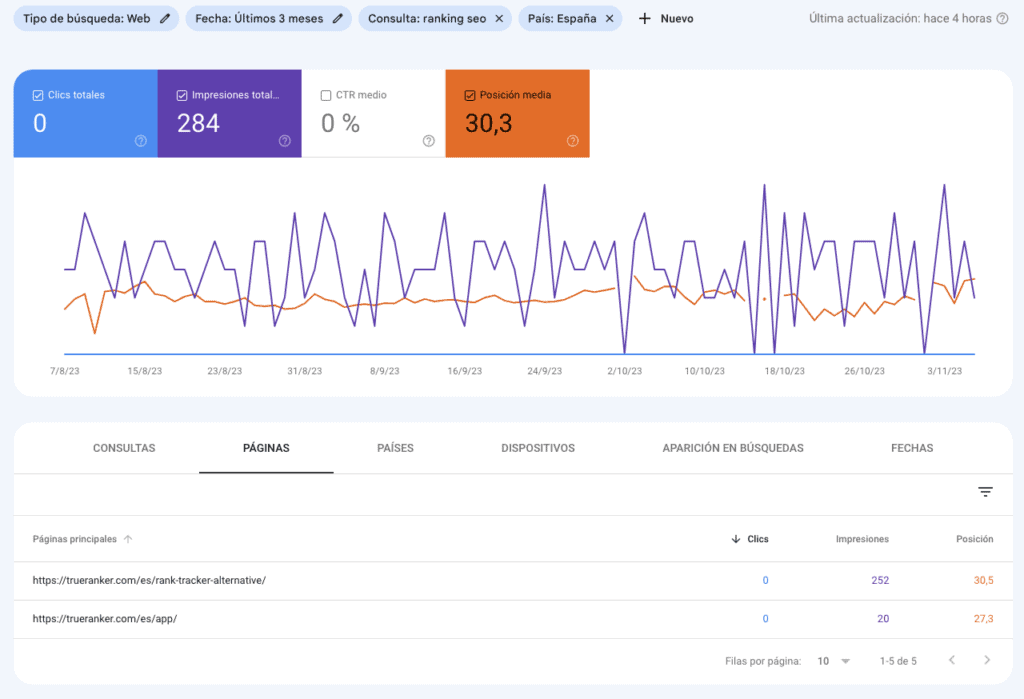
Going back to the example we have seen above with TrueRanker (in the cannibalization type section). We have the following data:
- Keyword: ranking seo
- Country: Spain
In the screenshot we can see that there are 2 URLs that are competing for the same keyword, and the one with the best average position is: https://trueranker.com/es/app/
Which is just the one that TrueRanker told us that had better positions. In this case, as we said above, we must take the necessary steps to tell Google that we want this URL to be the one that ranks for this keyword in this country.
Detect keyword cannibalization with TrueRanker
TrueRanker is us. We are a tool that takes care of monitoring your website rankings in Google. Besides that, we give you much more data (new keywords, data about competitors and of course, all the data about your possible cannibalizations).
To control the cannibalizations of your project, TrueRanker monitors the daily positions of your website with your keywords, and the moment you have a cannibalization in one of them, the system warns you with the “Possible cannibalization” icon.
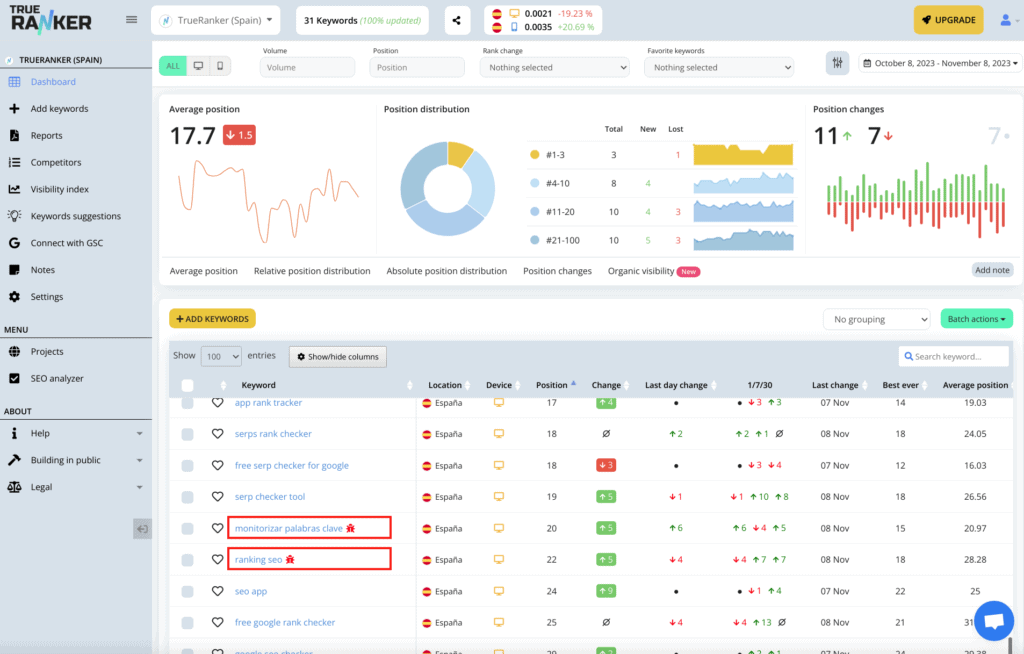
All you have to do is register here: https://app.trueranker.com/en/signup
Create your domain project and add your keywords. You have 14 days with 100 free keywords just for registering, more than enough to see if you have any active cannibalization.
Let TrueRanker do its job and get all possible cannibalizations to work with.
Also, if you like the tool, you can use the SEOCANNIBALIZATION coupon to subscribe. You will get a 50% discount the first month on all our plans.
Conclusion
The cannibalization of keywords is a situation to avoid on a website as it damages its positioning in Google. It is important to be able to detect this type of situation on your website to make the best decision to solve it for your business and for this it is key to use tools that facilitate this work (otherwise it is impossible to know them). Each cannibalization is a world, there is not exactly an action to take that fits all. It will always depend on the business, the keyword, etc. If you have any doubts, it is always best to ask an expert to guide you.
